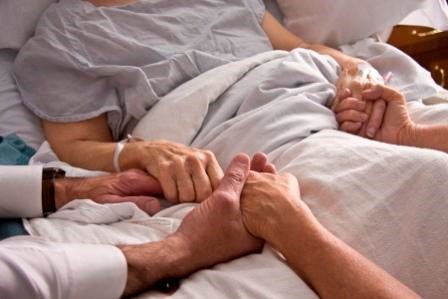
The Palliative Care Service is an interdisciplinary service for patients with advanced illnesses, and their families, dedicated to relief of suffering and improvement of quality of life using a comprehensive approach. As the disease advances and it is evident that the patient is unlikely to survive, maintenance of quality of life and eventually a focus solely on comfort measures become the priority. The goal of Palliative Care is to prevent and relieve suffering and to support the best possible quality of life for patients and their families, regardless of the stage of the disease or the need for other therapies. Palliative Care expands the traditional disease-model of medical treatments to include the goals of enhancing quality of life for patients and addressing the spiritual and social needs of patients and their families.
Within the New York City Health and Hospitals Corporation, Lincoln is among the top providers of Palliative Care services. In 2022 Lincoln Medical Center took care of more than 120,000 emergency visits, 500,000 ambulatory care visits and almost 20,000 inpatient discharges. Our Palliative Care consultation service has been active since 2004 and has grown to seeing more than 1,100 inpatients per year with an additional 600+ ambulatory care visits. Our training provides a wealth of clinical experience in the inpatient and outpatient settings as well as long term and hospice care.
The Hospice and Palliative Care Fellowship Program at Lincoln Health and Hospitals is fully accredited by the American Council of Graduate Medical Education (ACGME) and provides comprehensive post-graduate training in all areas of the Hospice and Palliative Care. Lincoln Health and Hospitals is located in the South Bronx (an area experiencing remarkable development and reinvigoration) and has long tradition of providing care to the underserved and the disadvantaged in the city of New York. The Palliative Care services Lincoln have been awarded certification as an Advanced Palliative Care Program by The Joint Commission (initially in 2012, with ongoing certification, last re-certified in 2023).
Teaching Methods
The principal teaching methods of our Hospice and Palliative Care Fellowship program involve a combination of individual patient-based encounters, case discussions and a series of didactic conferences. In each individual patient encounter, there is a detailed discussion with an Attending Physician or supervising provider. The didactic conferences similarly utilize a patient-based approach to integrate the basic sciences of pathophysiology with clinical presentations and an evidence-based approach to diagnosis and management. It is our strong belief that this patient-based approach utilizing both individual and group teaching maximizes our educational efficacy.
Outpatient Ambulatory Clinic – Tuesdays at 9AM and Fridays at 9AM- Clinics are located in 9A Cancer Center. Fellows are scheduled to either Tuesday or Friday sessions to accommodate off site rotation schedules
Palliative Care Interdisciplinary Team Rounds and Bereavement Rounds – Wednesday at 930AM – GME conference room 5C 192
Didactic sessions – Lectures, Journal Clubs – Thursdays at 10AM – GME conference room 5C 192
Tumor Board Meetings – In collaboration with Oncology, Radiation Oncology, Surgical Oncology and Subspecialists – Wednesdays at 8AM – Radiology 2C3 Room 578
Medical Grand Rounds – Prominent guest speakers, covering a wide range of important topics in Internal Medicine and its subspecialties – Fridays at 8AM – Auditorium
Self Care Rounds – a dedicated fellows session with Psychologist Dr. Heather Nash on the first Thursdays of every other month at 1PM – 4A Conference Room
Organ Donation Committee Meetings (ECHO) – held monthly (on Fridays, schedule tbd) in collaboration with Critical Care Physicians and LiveON NY – at 1PM in Conference Room 4
Research and Quality Improvement Meetings – held quarterly, time/date TBD
Palliative Care Committee Meetings – held quarterly, time/date TBD
Morbidity and Mortality Conferences- This conference is held monthly within the Department of Medicine to discuss deaths and problematic cases, identified by the ACMR, attending staff, or through the CQI process.
The one year fellowship comprises of the following rotations:
Inpatient Consultation Service
The fellows’ inpatient experience will comprise a minimum of six months and will include exposure to a diverse patient population with significant social, supportive and symptom management needs. The acute care inpatient consultative service consults on patients with a very broad array of diagnosis pertaining to pathologies from Cardiology, Pulmonology, Infectious Disease, Oncology, Hematology, Neurology, Nephrology, Geriatrics, Surgery, Trauma, Rheumatology and Gastroenterology. The consults arise from all across the institution, i.e. medical and surgical floors, medical and surgical intensive care units, emergency rooms and inpatient Pediatrics. The service is regularly consulted on patients with advanced and life-threatening illnesses to manage symptoms such as pain, dyspnea, nausea and vomiting, delirium, terminal agitation and restlessness, as well as complex discharge planning, defining goals of care, resolving ethical dilemmas and spiritual / social concerns.
Apart from pain and advanced illness symptom management, the team facilitates complex family meetings to establish goals of care, completion of healthcare proxy documents, and to discuss advanced care planning with a focus on advance directives and non-resuscitation orders. The fellows will gain abundant experience in issues surrounding the withdrawal of life sustaining treatments for which we have developed institutional protocols and management of symptoms at the end of life.
The fellows will interact with the interdisciplinary team, playing an instrumental role in assessing and coordinating the implementation of our symptom management recommendations. The fellows will also learn about the acute treatment of palliative emergencies such as spinal cord compression, brain metastases, superior vena cava syndrome and hypercalcemia. Rotation through Pediatrics service will provide the fellows with an opportunity to learn the Palliative aspects of Pediatric care. The fellows will attend Ethics Committee meetings and share consultations with the Ethics Committee members (many overlap with Palliative Care patients). The fellows will learn and provide bereavement therapy with the interdisciplinary team and facilitate debriefing on the acute care floor where a death occurs. Best practices have been compiled in the form of policies and literature syllabus to facilitate learning and online educational resources are readily available at the bedside. The fellows will hold Journal clubs and participate in ongoing committees such as ethics, tumor board, organ donation and palliative performance improvement.
Ambulatory Care Experience
Lincoln has an established Palliative Care Ambulatory clinic. This clinic expands access to Palliative Care services to patients that suffer from advanced debilitating illnesses that live in the community. Referral sources include patients known from inpatient consultation or new cases referred from other primary or specialty clinics. The diagnoses of the clinic patients include: advanced heart failure, cancer, neurodegenerative diseases, advanced lung disease, and end-stage renal / liver failure. The fellows ambulatory care experience is longitudinal throughout the year to facilitate continuity and evaluation of outcomes as the fellows will care for the patients throughout the trajectory of their illness from inpatient to clinic follow up and eventually hospice. The fellows are supervised by an Attending Physician in a one-on-one mentoring structure and with support of the interdisciplinary team. The fellow will master the treatment of symptoms that are prevalent in outpatients with life-threatening medical conditions. The fellows will learn about Opioid pharmacotherapy initiation, titration and rotation to best treat symptoms of pain and dyspnea. Other commonly managed symptoms include fatigue, anxiety, nausea, vomiting, depression and constipation. In addition to medical management, patient and family education is paramount in the ambulatory care setting. Addressing goals of care, advance directives, completion of health care proxy forms, delivering of bad news and referring patients to comprehensive home care services are key components of the ambulatory care experience. The fellows also learn to identify patients that need to be admitted to inpatient service for intensive pain and symptom management or those who need to be transitioned with home or inpatient hospice services. Full interdisciplinary support is available on site during the ambulatory visit.
Long Term Care
The long-term care experience will comprise a minimum period of one month (4 weeks) for each trainee and will take place at the Elizabeth Seton Children’s Center. The fellow will conduct morning rounds with an Attending Physician, Dr. Alvin Moyer, participate in interdisciplinary rounds, and patient and family meetings to establish improved symptom control, address goals of care, establish health care surrogacy and address advanced directives. All aspects of this rotation are mentored by the Attending Physician and the interdisciplinary team. During this experience the Fellows will be an integral member of the IDT, will present and discuss the patients with the team and faculty and will follow up the patients assigned to them. The fellows will participate in scholarly activities and are expected to present on a topic of their choice pertinent to Pediatric Palliative Care during the rotation.
Hospice Care
The Fellow’s Hospice experience will take place with VNS Health’s Home Hospice program. The hospice experience consists of 10 weeks total, scheduled as two 5 week rotations. A minimum of 25 home visits must be completed. The fellows may also rotate with VNS Health Hospice Liaisons at alternative sites and inpatient hospice units for an enhanced experience once they complete the minimum number of home visits. The fellows will evaluate the patients under supervision of the Attending Physician and with other interdisciplinary team members, including registered nurses who are certified in Hospice and Palliative Medicine, social workers and chaplains. The fellow will evaluate and discuss the cases with the interdisciplinary team members and tailor the care plan based on this care setting. The team will execute the plan in parallel with the patient and the family goals of care. The fellow will complete a log of the home hospice cases which will be discussed as clinical vignettes based on the interventions and outcomes. The fellows will provide patient and family education on end of life; provide symptom control, psychosocial and spiritual support. The fellows collaborate with the Hospices’ bereavement program. If interested fellows will be provided the opportunity to rotate at Harlem Hospital in collaboration with VNS Health to learn about Hospice Administration and becoming a Hospice Medical Director in the future.
Electives
Fellows have an elective rotation opportunity in an area of special interest. Elective rotations are available in Oncology, Radiation Oncology, Emergency Medicine, Behavioral Health, HIV, Neurology, Geriatrics, Anesthesia Pain, Pediatrics NICU, Physical Medicine and Rehabilitation (PM&R), Critical Care, Hospitalist Medicine, Cardiology, Wound Care, Research (supported by institution’s IRB) and Pulmonology.
Vacation
4 weeks of vacation, are provided.
Our Team
Chief of Palliative Care Service and Hospice
Palliative Medicine Fellowship Program Director
Associate Program Director, Hospice and Palliative Medicine Fellowship
- Simona Dlabal, NP, Palliative Care Nurse Practitioner
- Sasha-Gaye Sharrier, RN, Palliative Care Nurse
- Ileana Dejesus, PCA, Palliative Care Associate
- Giulia Herman, LMSW, Palliative Care Social Worker
- Father Bartholomew Amobi, M.Dv, BCC Palliative Care Chaplain
- Ana Pena, Hospice and Palliative Medicine Fellowship Program Coordinator
Fellows 2024-2025
Off Site:
Ritchell Dignam, MD
Hospice Medical Director, VNS Health
Alvin Moyer, MD
Chief Medical Officer, Elizabeth Seton Children’s Center
Contact us
If you have any questions, please don not hesitate to reach out to our Program Coordinator:
Ms. Ana Pena
email: penaa@nychhc.org
phone: 718-579-6682







